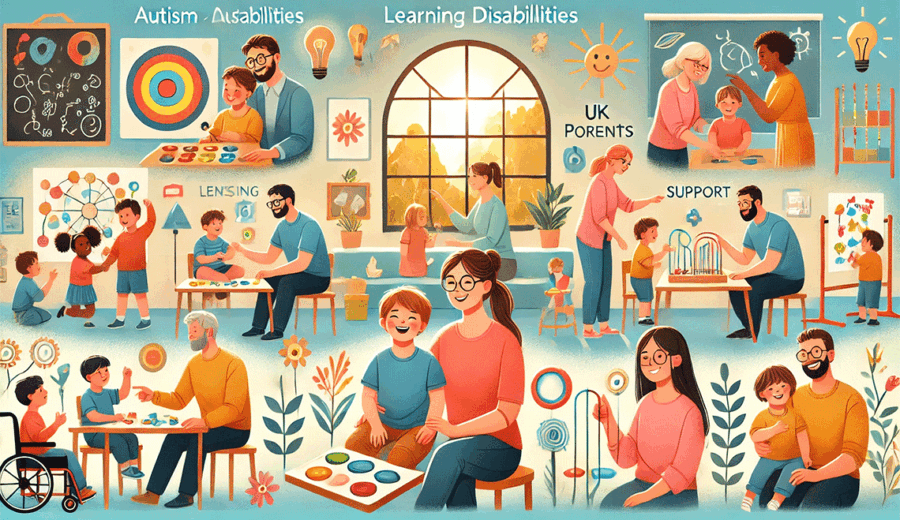
Autism: A Guide for UK Parents
Understanding Autism and Learning Disabilities: A Guide for UK Parents
Parenting a child with autism or learning disabilities can be both a challenging and rewarding journey. With the right understanding and support, parents can create an inclusive and nurturing environment that allows their child to thrive. This guide provides detailed insights into autism, learning disabilities, available support systems, and practical strategies to empower UK parents.
What Is Autism Spectrum Disorder (ASD)?
Autism Spectrum Disorder (ASD) is a developmental condition that affects how individuals perceive and interact with the world. It is referred to as a “spectrum” because of the wide variation in challenges and strengths individuals experience.
Characteristics of Autism
Social Interaction and Communication: Children with autism may struggle with understanding social cues, making eye contact, or forming relationships.
Repetitive Behaviors and Routines: A preference for routines and repetitive actions is common, often providing comfort and predictability.
Sensory Sensitivities: Many autistic children are hypersensitive or hyposensitive to sensory inputs, such as sounds, lights, or textures.
Early Signs of Autism
Early identification is essential for accessing timely interventions. Common early signs include delayed speech or language development, limited eye contact or difficulty engaging in social play, repetitive movements or fixation on certain objects or topics, and unusual reactions to sensory inputs such as loud noises or bright lights.
Understanding Learning Disabilities
Learning disabilities are lifelong conditions that affect intellectual ability and everyday activities. These disabilities are distinct from learning difficulties such as dyslexia or ADHD.
Examples of Learning Disabilities
Down’s Syndrome: A genetic condition characterized by developmental and intellectual delays.
Fragile X Syndrome: A genetic disorder that causes intellectual disability and behavioral challenges.
Global Developmental Delay (GDD): A significant lag in two or more areas of development, such as speech or motor skills.
Impact of Learning Disabilities
Children with learning disabilities may experience challenges with problem-solving, memory, and reasoning. They may also face difficulty acquiring new skills or understanding concepts and rely on structured and repeated instructions to complete tasks.
How Are Autism and Learning Disabilities Diagnosed in the UK?
The UK provides diagnostic services through the NHS, although waiting times can be long. Private assessments are an option for some families to expedite the process.
Who to Consult
General Practitioner (GP): The first point of contact for concerns about developmental delays.
Paediatricians: Specialists in child development who assess autism and learning disabilities.
Psychologists and Therapists: Professionals who evaluate intellectual and behavioral aspects.
Getting Support Post-Diagnosis
Once diagnosed, parents can seek resources such as an Education, Health, and Care Plan (EHCP) to outline their child’s specific needs.
Education and Autism-Friendly Practices
The UK government mandates that schools provide support for children with autism and learning disabilities. Many mainstream schools and special schools adopt inclusive practices to meet individual needs.
Education, Health, and Care Plans (EHCPs)
An EHCP is a legal document that details the support a child requires in education, health, and social care. Parents can request an assessment from their local authority to obtain this plan.
Inclusive Teaching Practices
Visual aids to support learning and communication, sensory-friendly classrooms with tools like noise-canceling headphones or quiet zones, and predictable routines to reduce anxiety and provide structure.
Specialist Schools
In cases where mainstream education is not suitable, parents can explore specialist schools designed for children with complex needs.
Support Systems for Families
Several organizations and services in the UK provide resources, advocacy, and emotional support for families navigating autism and learning disabilities.
Key Organizations
National Autistic Society (NAS): Offers guidance, training, and a helpline for families.
Mencap: Focuses on support for individuals with learning disabilities and their families.
Local Charities and Groups: Community organizations often provide workshops, parent meetups, and playgroups for children.
Parent Support Networks
Connecting with other parents through support groups can provide emotional comfort and practical advice. Many groups are available online and in-person, catering to specific communities or needs.
Practical Tips for Parents
Creating a supportive home environment is vital for children with autism or learning disabilities.
For Children with Autism
Structure and Routine: Maintain a consistent daily schedule to reduce stress and anxiety.
Sensory-Friendly Spaces: Use weighted blankets, sensory toys, and quiet zones to support sensory needs.
Visual Schedules: Provide visual cues for activities to aid understanding.
For Children with Learning Disabilities
Task Breakdown: Divide tasks into small, manageable steps to build confidence.
Use of Visual Supports: Tools such as picture charts can simplify instructions.
Positive Reinforcement: Celebrate small achievements to encourage progress.
Financial Support and Benefits
Raising a child with additional needs often comes with financial challenges. The UK offers several benefits to help families.
Available Benefits
Disability Living Allowance (DLA): Financial support for children under 16 with disabilities.
Carer’s Allowance: A benefit for parents or guardians who care for a disabled child.
Grants for Equipment: Charities often provide funding for sensory tools, assistive technology, or therapy sessions.
Accessing Benefits
Parents can apply for these benefits through government portals or seek help from advocacy organizations.
Fostering Inclusion and Community Awareness
Society’s understanding of autism and learning disabilities is evolving, but stigma and misinformation persist. Advocacy and education are key to promoting acceptance and inclusion.
Raising Awareness
Community Events: Host or participate in autism-friendly events to foster understanding.
Social Media Campaigns: Share information to dispel myths and encourage empathy.
School Programs: Encourage schools to teach students about neurodiversity.
The Journey of Parenting
Parenting a child with autism or learning disabilities is a unique journey that requires resilience, patience, and love. By leveraging available resources, seeking support, and advocating for their child’s rights, parents in the UK can create an environment where their child can flourish. Understanding is the first step to empowerment, and every effort contributes to a brighter, more inclusive future for all children.





Leave a Reply